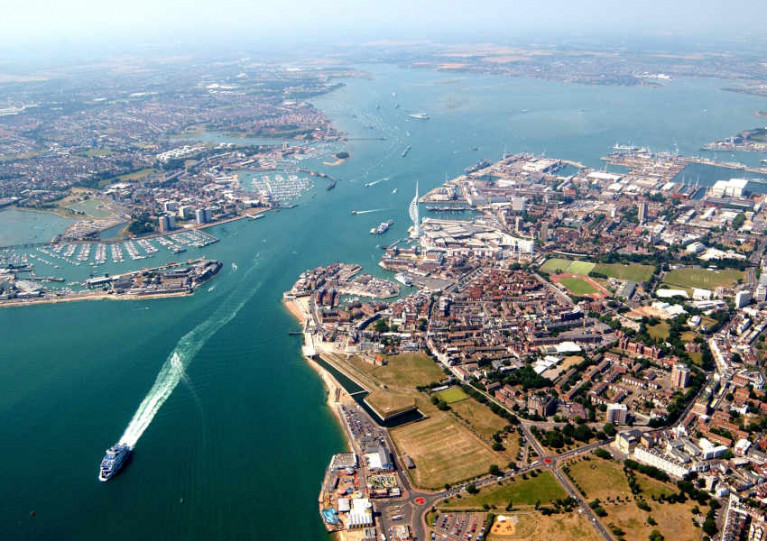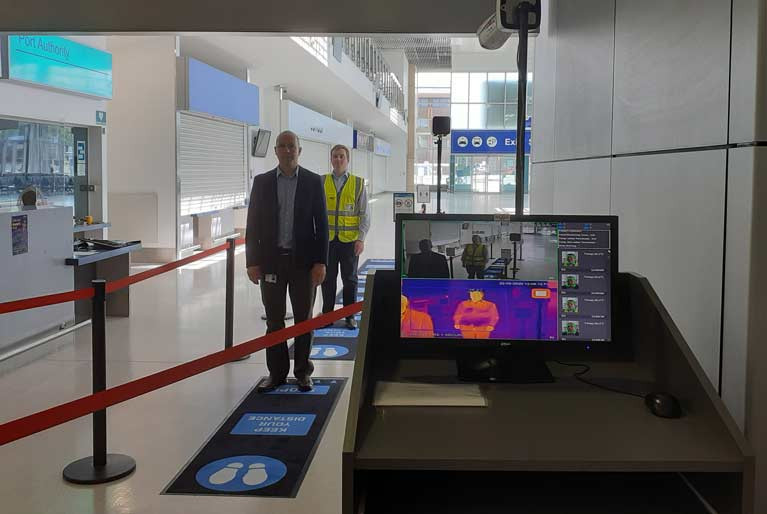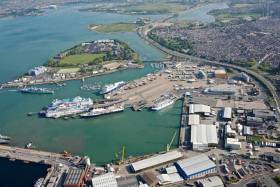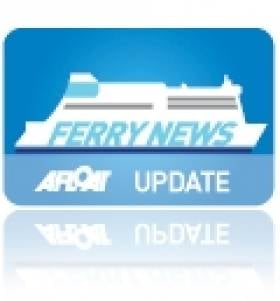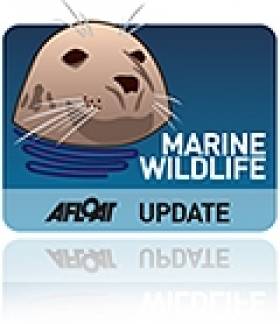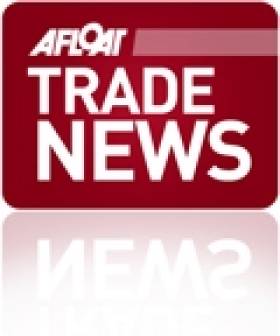Displaying items by tag: Portsmouth
First Steel Cut at Harland & Wolff Appledore for New Anchor/Cable Barge Based in UK
Belfast shipbuilder, the Harland & Wolff Group have cut the first steel on a new cable barge it is building for defence contractor KBS Maritime of Portsmouth from where the vessel will be located at the UK’s main naval base.
To mark the steel cutting, a ceremony took place at Harland & Wolff's Appledore shipyard, north Devon. Attending the occasion at the English yard were technical representatives from KBS Maritime and H&W’s engineering team.
The contract valued at approximately £800,000, is to see the Harland & Wolff designed vessel be delivered this Spring, with the specialist cable barge to enter service at the Royal Navy’s main naval base at Portsmouth, Hampshire.
All construction work will be carried out at the Appledore in parallel with existing defence and commercial projects currently underway at the shipyard located near Bideford.
KBS Maritime Ltd is a joint venture between KBR and BAE Systems and delivers hard facilities management and alongside services to support the Portsmouth naval flotilla.
The new cable barge will be used by KBS Maritime as a floating platform to lower anchors and associated cables chains from naval ships so that they can be tested and refurbished as required. The newbuild is to support operations for existing mine-hunters and frigates and when commissioned their successors of the new Type 26’s and Type 31’s.
Naval architects at Harland & Wolff have worked closely with KBS Maritime’s engineering team during the design phase to incorporate features that will improve the safety, capability and efficiency of alongside operations.
An existing barge which remains in service and for over the past 25 years, has been heavily modified and the learnings from these modifications have been incorporated into the newbuild design.
Portsmouth International Port Sets Course for Shore Power
Portsmouth City Council's cabinet in the UK have approved a strategy for shore power provision at Portsmouth International Port, which will allow visiting ships to switch their engines off whilst alongside.
The port has bold plans to tackle emissions and carbon, which will ultimately help them to become one of the UK’s first zero-emission ports.
The plans, which aim to improve air quality and the port's carbon footprint, have been put together with the government’s Maritime 2050 strategy in mind.
To achieve that ambition, Portsmouth is blazing a trail in the adoption of experimental green technologies, turning the port into a living laboratory.
In a landmark decision, Portsmouth's City Council, who own and operate Portsmouth International Port, agreed to support the port's efforts to provide shore power, subject to securing funding.
This includes the short term development of a battery storage solution, for providing shore power to smaller cruise vessels, as well as a long-term ambition of supplying all vessels that visit the port.
With an existing AI controlled ‘master’ battery on-site, funded by Innovate UK, combined with new battery storage being installed alongside a new solar array, the port will have enough energy to supply small cruise ships whilst alongside. One of the port's long-standing customers, Noble Caledonia, has agreed to upgrade their vessels to take shore power, when the project goes ahead.
For the longer term, options are now being explored to increase the amount of power available at the port, so that shore power can be rolled out to all of the berths at Portsmouth. However, this will require government support across the ports industry, given the investment required.
Mike Sellers, port director, said: "We're determined to be industry leaders when it comes to sustainability. This innovative approach, which incorporates existing technologies already available or planned at the port, means we can look to have shore power up and running by the end of 2022 for smaller cruise ships. We're now looking at long-term plans to roll out this capability to our other berths.
"We're supporting Maritime UK's call for significant government funding in the spending review to support these changes, so that levels of investment are similar to the aviation sector, who get significant support.
"With support, there are many quick sustainability wins within the industry, and we already have the demand. The shipping industry are pushing forward on clean fuel technology and our largest customer, Brittany Ferries, has placed orders for new hybrid ferries for the Portsmouth to France routes, operational from 2024.
"Collaboration is key to upgrading the port's electricity supply, so that clean energy can be provided to all vessels when they are alongside."
Portsmouth City Council's Cabinet also committed to continue their support for the port’s green recovery sustainability drive, which includes a hydrogen electrolyser on the port, rolling-out the current fuel filtering project and the construction and piloting of an external fine particle filter at the port boundary.
Jerry Clarke, senior project manager said: "As a port operating in the heart of a major city, and that is owned by the people of Portsmouth, we have an obligation to do everything we can to minimise our impact as we continue to grow sustainably in the coming years.
"I'm incredibly proud to have led on the improvements we've made in the past two decades, and thank the council for their support as we move towards our net-zero carbon and zero emissions goals."
Portsmouth To Host Yacht Racing Forum This November
Portsmouth Harbour will be the venue for the UK’s first hosting of the annual Yacht Racing Forum this November.
The event on 23–24 November will be based around the harbour, with the main conference taking place in Portsmouth Historic Dockyard’s Action Stations and Boathouse 7.
The city’s hosting of this international event is the result of successful negotiations with organisers MaxComm Communication.
Touted as “the leading annual conference for the business of sailing and yacht racing”, the forum brings professional sailors together with boat builders and designers, sponsors, technical providers and financiers in “a unique opportunity to network, to debate the future of the sport, and to develop business opportunities”.
The Yacht Racing Forum 2020 will take place in the south coastal English port alongside the HMS Victory, HMS Warrior, Mary Rose and two new aircraft carriers, HMS Queen Elizabeth and HMS Prince of Wales.
Portsmouth is also regarded as a yacht racing hub and is the base of INEOS Team UK, Alex Thomson Racing, North Sails, Selden Masts, Raymarine and more.
“The YRF will help to shine the spotlight on our truly historical yet totally innovative bustling marine sector and develop further international awareness of the harbour as a destination for leisure and racing boats,” said Mark Bowden, chief executive of Portsmouth Harbour Marine.
Bernard Schopfer of MaxComm Communication added: “This will be the first time that the forum will be held in Great Britain, which is surprising given the importance of sailing there.
“It will be an exceptional opportunity for all members of the British sailing industry to demonstrate their know-how and expertise to an international and highly specialised audience.”
Portsmouth International Port says it's the first UK port to install a thermal temperature scanner, which will be available for ferry and cruise operators to screen their passengers.
The temperature screening technology involves using a camera detection system to monitor the temperature of passengers.
In the beginning, it will be trialled as an option for foot passengers joining ships to help support infection control onboard. If successful the technology could then be used elsewhere in the port.
Mike Sellers Portsmouth International Port's director said: "We want to make sure we're in the best position to welcome back passengers in a managed, safe and sensible way.
"Being able to help support our ferry and cruise lines by providing solutions for potential health protocols, should operators choose to use it for their customers, means we're ready to go once travel restrictions are eased.
"There are ongoing discussions about a common framework for health screenings, which are being explored by all transport operators.
"Until there is an international standard we want to make sure we can meet a universal expectation to reduce the transmission of the coronavirus."
The thermal imaging scanner is one a raft of measures being implemented to prioritise health and safety, an overhaul of the how the terminal will function once it reopens for passengers is underway, including appropriate full-face PPE for customer-facing staff, social distancing measures, clinical level hand sanitation products on door handles and cleaning stations.
Mike Sellers continued: "Our key workers continued to operate since the lockdown restrictions were implemented providing essential operations for critical freight and lifeline services. It is even more important as a major port we have the right measures in place to manage the flow of people as well as goods safely.
"We're working with our partners in Border Force, Condor Ferries, Brittany Ferries, and also listening to our cruise customers about what needs to be in place when travel restrictions are eased.
"Even if overseas travel is delayed, UK based cruise itineraries will still be popular as the public look to find a way to have a break locally. As a port suited to small medium sized, boutique sailing ships, we're in an ideal position to manage a phased return to sailing, especially with the draw of our city's attractions.
“We also support the idea for sea bridges to help encourage safe travel. As a method of transport ships provide outside space, room to move around indoors, and lend themselves to social distancing measures.”
Working with Border Force the port will also support any health measures the government may put in place for passengers coming into the UK.
FAQs
Will all passengers automatically be screened?
If ferry and cruise operators choose to use the camera, they can screen foot passengers before they arrive on board.
What about those in vehicles?
Currently, we have one camera, which for logistics reasons is best placed in the terminal for foot passengers and this meets the needs of all cruise customers too.
If the trial was productive then we work would with operators to install elsewhere.
How about arrivals into the UK?
At the moment this is to support our customers minimise infection controls on board, however, if the government wanted to implement strict health protocol measures we could explore introducing the camera elsewhere.
What happens if someone triggers the alarm with a high temperature?
We are only alerting the fact someone has registered a high temperature to the ship’s medical teams who will carry out their assessment whether passengers should board. We appreciate there are a number of reasons why someone might have a high temperature, but we are following PHE protocols which state anyone with a fever should remain at home and self-isolate.
Currently, the only way to suitably check whether the virus is the cause is by testing.
Could this be used for staff?
Protecting our staff is has been our main concern through this whole pandemic situations, scaling back operations so only people who are absolutely necessary come on site. Closing the terminal to the public and now we’re exploring the right PPE and protection when passengers do return.
Staff reporting high fever should stay away from work and as a key worker register for a test instead. We would discuss with our teams if we thought screening before work would benefit their safety further and exploring possible options.
What is the accuracy rate?
We scoped the market and believe this registers the best accuracy rate is +/- 0.2 degrees, if someone did score a high reading they would be screened again and that’s when the ship’s medical team would make an assessment if the temperature remained high.
Portsmouth Bids to Host Yacht Racing Forum
Portsmouth Harbour Marine and Portsmouth City Council are in discussions with MaxComm Communication with the aim of hosting an international sailing and yacht racing conference in Portsmouth in November 2020.
The annual Yacht Racing Forum draws a rich pool of speakers from the marine community. Held over two days, it brings together pro-sailors, suppliers, yacht clubs, agents, boat builders, technology companies and many others to meet, network, discuss and debate the key issues in the yachting industry. If Portsmouth’s bid is successful, it will host the 14th iteration of the conference.
“Portsmouth is the obvious choice for the conference’s location in 2020,” says Mark Bowden, chief executive, Portsmouth Harbour Marine. “This is such an exciting time for marine development. Portsmouth and Gosport have a wealth of high-tech marine businesses and supporting industries such as marinas and boatyards. Plus, racing teams such as Ben Ainslie and his Team INEOS and Alex Thomson Racing, who are both at the cutting edge of design and technology, are based here. We’ve got the facilities and expertise to host the conference – now we need to put the final few pieces in place to make it happen.”
"Both Portsmouth and Gosport Councils are enthusiastic to support local marine businesses on the international stage,” says David Williams, Chief Executive of Portsmouth City Council. “We have a cluster of world-class yachtsmen and women based around Portsmouth Harbour and many cutting-edge industries related to yachting and the wider marine sector.
“Hosting the International Yacht Racing Forum would provide the stage to showcase Portsmouth Harbour - the heart of the UK’s maritime design, innovation, technology, and racing waters. If we’re successful in bringing the conference to the city, it will be a great platform for our marine businesses and wider tourism.”
Bernard Schopfer, CEO of Maxcomm says: “We are very excited to be talking to Portsmouth about bringing our annual conference to the city in 2020. We have not held the event in the UK before, and with so many exciting projects and innovations being developed around the south coast of the UK it seems a natural destination. Portsmouth Harbour also has so much maritime history, we are confident in attracting a truly international group of delegates and speakers.”
The final decision about the location of the 2020 conference will be made in late November.
#ferries - Only 10% has been put up by the Government of the cost of contingency plans being set up to avoid major disruption at one of the UK’s main cross-Channel ports in the case of a no-deal Brexit.
As the Irish Examiner writes, Mike Sellers, the director of Portsmouth International Port, said that emergency plans had been prepared in case a deal was not agreed with the EU.
But he said the Department for Transport (Dft) was refusing to acknowledge there was an issue at the Hampshire port.
Mr Sellers explained that with only 13 lorry lengths between the port and the motorway network, any delays at the border through new customs checks would cause congestion on the main route connecting the Hampshire island city.
Mr Sellers said that the Hampshire and Isle of Wight Local Resilience Forum (LRF) had developed a plan for two lorry triage processing points to be created, one at the edge of Portsmouth and the other on the A31 near Winchester, to streamline arrivals at the port.
But he said the cost of setting up the system required in a no-deal situation was £4 million while the Government had only provided £345,000 in funding.
The newspaper has more here on the major UK ferryport.
New Ferry Port Manager Announced at Portsmouth International Port
#portsmouth – Portsmouth International Port on the UK south coast has a new Ferry Port Manager, although the man now in charge of all ferry operations certainly isn't a new face at the Port.
Kalvin Baugh joined the team at Portsmouth in 2008 as Deputy Ferry Port Manager. His promotion comes after seven years of hard work, and is at a challenging time for the ferry industry given the current economic climate and the continued environmental challenges.
Kalvin was born and grew up near Cardigan, West Wales. After leaving school aged 18 he joined Cunard as an Engineer Cadet. The apprenticeship led to a role as Engineering Officer four years later.
In 1985 Kalvin moved to Portsmouth, taking a job with the Ministry of Defence at HM Naval Base. Five years later he went back to sea, working for companies such as Geest, Nissan, and Thames Water. In 1994 Kalvin started work for United Marine Dredging, part of the TARMAC Group and spent 15 years as the company's Marine Operations Manager based in Chichester.
Kalvin says, "There's never a dull moment working at Portsmouth International Port. No two days are ever the same for me. My main aim is to help to ensure we always provide an excellent service for passengers and operators, whatever challenges we face."
Inflatable Whales Pop up at Portsmouth International Port for Marine Wildlife Festival
#portsmouthwhales – It's not often children get the chance to put their head in the mouth of a shark, but that's just one exciting adventure they can have at Portsmouth International Port's Marine Wildlife Festival in February.
It won't be a real shark, of course, but one of 13 life sized inflatable models of whales, sharks and dolphins that will be on display in the terminal building. The biggest is 42–feet long, that's 13 metres of whale that you can stand next to. Four will be hanging from the ceiling.
The 'pop up' exhibition opens on the 11th February, with classes from schools all around Portsmouth already booked to come and take part in a "Whale Workshop". Experts from marine wildlife charity ORCA will be taking lessons, with students learning all about the whales, dolphins, porpoises, sharks, seals and turtles that can be found on a Ferry crossing from Portsmouth International Port. Passengers and locals can also come and visit at any time during the four day long exhibition.
Whale watching is becoming a popular holiday pastime, with people paying thousands for trips around the world. Yet few realise they can see a huge variety of whales and other species when sailing from Portsmouth to Spain as part of a holiday or other trip. This is because the ferries travel through the Bay of Biscay, which is a whale and dolphin hotspot thanks to the variety of depth ranging from 200 – 4,999 metres deep and the abundance of food that suits many different species. This includes the deep diving Sperm Whale and Cuvier's Beaked Whale, making it a perfect spot for passengers to go looking for these magnificent creatures.
Martin Putman, Port Manager of Portsmouth International Port, said 'Since Brittany Ferries launched its whale watching mini cruises a few years ago we've become known as a gateway port for seeing whales, dolphins and other beautiful marine mammals. Anyone heading off on holiday to Spain has the chance of a memorable encounter, and this incredible Marine Wildlife Festival gives a great idea of what you might see."
ORCA has been working hard with Brittany Ferries for 10 years, with wildlife officers onboard the 'Pont Aven' and 'Cap Finistère' recording sightings of Marine wildlife. The charity is always keen to share its knowledge with passengers, helping them to understand more about what is in the sea around them.
Anna Bunney ORCA Community Wildlife Officer said, "People don't fully appreciate how accessible a wide variety of species is right on our doorstep. There's no need to spend big money to see whales when it's often an added bonus when travelling from Portsmouth International Port. We're delighted to be a part of the Marine Wildlife Festival, bringing this rich variety of creatures to life inside the terminal building."
On display will be life-size models of a 13m long female Sperm Whale, 8m Minke Whale, 8m Basking Shark, 6m Pilot Whale, 6m Orca Whale, 3m Orca Whale Calf, 3m, Risso's Dolphin, 3m Bottlenose Dolphin, 2m Common Dolphin, 2m Striped Dolphin, 1.5m Harbour Porpoise, 2m Grey Seal male, female & calf, and a 2m Leatherback Turtle.
There will be one more loveable whale also in attendance. Pip, Portsmouth International Port's cuddly human sized mascot, will be making an appearance for photos with young children and families off on half term holidays.
Sunsail's Move Away From Portsmouth Puts Jobs At Risk
#TradeNews - BBC News reports that nearly 100 jobs could be at risk in Portsmouth as sailing holiday firm Sunsail plans to relocate its operations to London.
The company, which specialises in sailing tourism and boat rentals, says it is consulting individually with staff as it consolidates with other brands under the Specialist Holidays Group umbrella - including yacht operator The Moorings - at a new headquarters in Surbiton.
However, the company has confirmed that its UK operations of schools and events will remain in Port Solent and are not affected by the relocation plans.
Bilbao Returns to Baltic Sea 'Roots'
For the last 17 years the Pride of Bilbao has operated between Portsmouth and Bilbao under charter to P&O. Built in 1986, she was launched as Olympia for Viking Line between Stockholm and Helsinki, then the Baltic Sea ferry was one of the largest overnight passenger capacity ferries in the world. At 177 metres long the vessel can accommodate 2552-passengers, 600-vehicles and space for 77-trucks. She has a sister, the Mariella, which currently operates on Viking Line's Stockholm-Mariehamn–Helsinki service.
In 1993 the vessel was renamed Pride of Bilbao and launched a new service on the Bay of Biscay, under charter from her Scandinavian owners. The following year ICG purchased the Pride of Bilbao from Viking Line and she was re-registered to the Bahamas. The vessel was subsequently entered into a British bare-boat charter arrangement between P&O Ferries and ICG. Due to unsustainable losses the route closed on 28 September this year but rivals Brittany Ferries soon shortly announced they would reopen the route in Spring 2011.
Throughout the Pride of Bilbao's career under ICG (parent company of Irish Ferries), the cruiseferry has only once visited Ireland. In between Spanish sailings, she was sub-chartered for a three-day Christmas mini-cruise from Portsmouth to Dublin in 2004, where the Pride of Bilbao berthed at the ferryport close to the ICG headquarters.


























